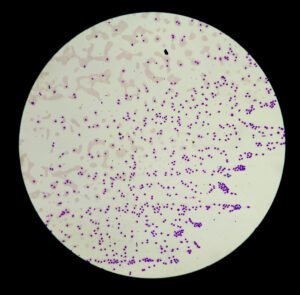Eliminating Cancer Cells by Changing Their Identity

In the late 1980s, scientists developed a novel approach to treating acute myeloid leukemia (AML), a type of blood cancer. Called differentiation therapy, it amounted to a bona fide cure for many patients. The treatment works by triggering cells “stuck” with a cancerous identity to keep developing and maturing, giving rise to different, non-disease- causing types.
Unfortunately, this treatment only works for a small subset of patients who have a particular subtype of the disease, called acute promyelocytic leukemia (APL). “For a long time, it was seen as kind of a one-off,” says M. Andres Blanco, PhD, an assistant professor at the University of Pennsylvania School of Veterinary Medicine.
Now, Blanco and colleagues have identified a new way to trigger differentiation in AML—one with potential to treat a much wider array of AML patients, according to the team which published its research (“KAT6A and ENL form an epigenetic transcriptional control module to drive critical leukemogenic gene expression programs”) in Cancer Discovery.
Their study identifies an enzyme that regulates the process by which AML cells differentiate. In both cell lines and an animal model, the researchers found that inhibiting this enzyme, particularly in combination with other anti-cancer therapies, prompted AML cells to lose aspects of their identity associated with aggressive growth. The cells also began to exit the cell cycle, on the path toward maturing into a new cell type.
“Epigenetic programs are dysregulated in acute myeloid leukemia (AML) and help enforce an oncogenic state of differentiation arrest. To identify key epigenetic regulators of AML cell fate, we performed a differentiation-focused CRISPR screen in AML cells,” write the investigators. “
This screen identified the histone acetyltransferase KAT6A as a novel regulator of myeloid differentiation that drives critical leukemogenic gene expression programs. We show that KAT6A is the initiator of a newly-described transcriptional control module in which KAT6A-catalyzed promoter H3K9ac is bound by the acetyllysine reader ENL, which in turn cooperates with a network of chromatin factors to induce transcriptional elongation.
“Inhibition of KAT6A has strong anti-AML phenotypes in vitro and in vivo, suggesting that KAT6A small molecule inhibitors could be of high therapeutic interest for mono or combinatorial differentiation-based treatment of AML.”
“AML typically has a poor prognosis, with five-year survival below 50%,” says Blanco, senior and a co-corresponding author on the study. “If an approach like this, in combination with other therapies, could make the cancer less aggressive, that is notable and could help a lot of patients.”
https://www.genengnews.com/topics/omics/eliminating-cancer-cells-by-changing-their-identity/


Your Comment :